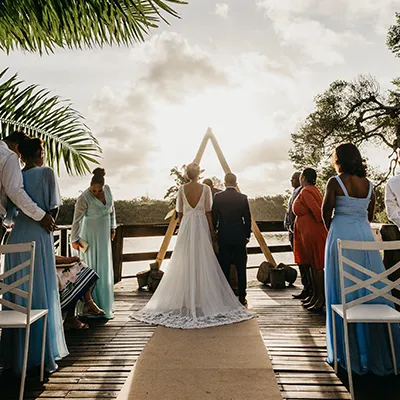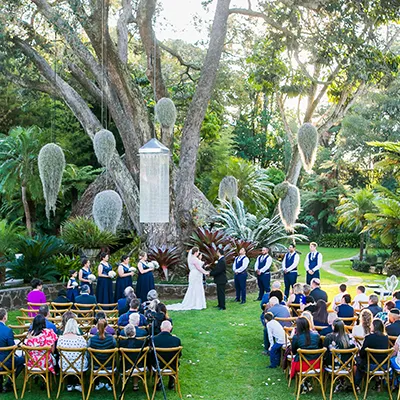Make the Most of Wedding Season Travel: Tips for Guests
Becky Hart | May 3, 2023

It’s here. Another Save the Date card. And this wedding is in some far-flung location. You guessed it. The happy couple has opted for a destination wedding.
As a wedding guest, certain things are expected of you. In most cases, you'll need to get a gift. You might even be asked to attend a bridal shower or bachelor party. When you’re invited to a destination wedding, there’s even more for you to plan and, of course, spend your money on.
According to Zola, people attended an average of four weddings and seven wedding-related events in 2022. To do that, those guests traveled to an average of three cities and took two to five days off work.
No matter how you look at it, that’s an investment on your part and you’re not even the one getting hitched! Especially if you’re in that age group where it seems like another friend is getting married every week, the time and money you spend on your loved ones adds up quickly. So how do make the most out of wedding season, and spend your time and money wisely without offending the bride and groom? We’re glad you popped that question.
How Much Do Destination Weddings Cost?

It's no secret that the couple getting married can easily spend thousands of dollars on a wedding, regardless of where it is. As a guest, though, you could have to come up with a few hundred dollars as well, just to witness the happy occasion.
According to Zola’s 2022 survey of wedding guests, the average cost to attend a wedding that required air travel was $1,314. If you drove to the wedding, the average cost was about half that. Travel or transportation accounted for most of those totals, while accommodation ranked third.
Who Pays for a Destination Wedding?
As the guest at a destination wedding, you may be responsible for more of the bill than you realize. If you’re flying — a very real possibility since Mexico and the Caribbean remain popular destination wedding locales — you can expect to pay for airfare. The couple might pay for transportation to get you from the airport to the resort or venue, but any other transportation will be up to you.
Guests are also typically expected to pay for their own accommodations. Ask the couple about a reserved block of rooms at a hotel or resort since this can mean that you’ll pay less than booking independently. But, even though it could be less expensive, the bill is ultimately yours to pay.
Food, drink, and activities not related to the wedding should also be budgeted for. In other words, the couple will pay for the cocktail hour or reception dinner, just as they would if the wedding were in your hometown. However, since you’ll likely be there for a few days — more on that in a minute — other meals or any sightseeing you plan to do on your own is an expense you should expect to pay yourself.
Can you get a refund if the wedding is cancelled?
What if the wedding gets cancelled after you’ve already made your travel arrangements? Who pays for that? Some schools of thought say that the couple should cover your financial losses if they cancel the wedding.
It's best not to depend on this, though, because you never know why they might have called everything off. Maybe the couple suffered their own financial emergency. If they can’t afford their own wedding, it’s not reasonable on your part to expect them to reimburse you for your airfare and hotel. They might have cancelled because of a health emergency, and the last thing you want is to bug them for money when they’re dealing with their own challenges.
Although not fun to think about, it can be wise to factor a potential cancellation into your budget. And don’t forget travel insurance, which might be able to help you recover some of your investment.
How to Make the Most Out of Wedding Season

1. Take extra time off.
Destination weddings are more than just a ceremony and a reception. The trend now is for these weddings to be three to five straight days of activities with the ceremony being held on a Friday or Saturday and several events being hosted before, after, or both.
For example, the couple might host a reception cocktail for guests on a Thursday, a tour of the city for everyone on Friday, the ceremony and reception on Saturday, and a farewell brunch on Sunday.
Clearly, you’re investing a lot in this occasion, but if you have the vacation days and the flexibility in your schedule, adding an extra day to your trip can help you make the most of that investment. Flying mid-week can often save you on airfare compared to flying on the weekend, so timing your return for a Monday or Tuesday rather than right after the ceremony can work in your financial favor.
When Seven Corners writer Grace Lower was planning to attend her friends’ weddings, she decided to extend her trips for convenience, too. “Rather than ducking out of the party early or leaving at the crack of dawn on Monday, I’m taking an extra day for the trip home to keep stress and sleep deprivation at bay.”
2. Build in additional activities.
You know you can save money with bleisure travel — combining a business trip with a vacation — and thankfully, the same idea works with wedding travel. You’re already spending the money to get to and from the destination. Now all you have to do is add some personal activities to your itinerary and turn the trip into a full vacation.
“The weddings I’ll be attending aren’t in particularly exotic locations, but I fully intend to make the most of the time I have there,” said Grace, whose non-wedding itineraries included local restaurants and a famous bakery, whitewater rafting, an art museum, and botanical gardens. “I can’t wait to celebrate with my friends and loved ones, but I’ll have plenty to do when the parties wind down.”
On the more extreme end of the spectrum, I attended a friend’s wedding in England. I was determined to get my money’s worth from an expensive flight from the U.S. to the U.K., so I arrived a few days before the ceremony to get over jetlag and explore the small English villages near the wedding venue. Then I took another week afterwards to travel in Scotland on my own, eating haggis, visiting castles, and generally just enjoying my time away.
3. Research budget airlines.
While you can usually save money on airfare by extending your wedding travel and flying mid-week, you might be tempted to save even more by flying with a budget airline. Before you book any flight, do the math to make sure the so-called deal is actually saving you money.
Grace did a lot of research before buying tickets and found some great prices. That research included the cost of luggage. “One downside of my cheap flights, of course, is that fees for carry-ons can add up,” she said. “Since all my flights are nonstop, I’m forgoing my carry-on and splitting a large, checked bag with my boyfriend."
4. Strike a balance with accommodations.
Remember we said that paying for accommodations is typically the guests’ responsibility. For that reason, don’t feel obligated to use the block of rooms the couple reserved. If that makes the most sense economically and is convenient, by all means, get a reservation at the recommended hotel.
Take time to make sure the reserved block really makes the most sense, though. Grace was able to save money at one of the weddings she attended by splitting the cost of an Airbnb with some friends. At another one, she crashed on a friend’s couch. It might not have been fancy, but it fit her needs for that trip.
Grace did opt for the hotel when it made sense, though. “The third wedding will take place in my hometown, but rather than crashing with my parents, I’ve decided to spring for a room in the hotel block. This wedding will have an after-party that will last until 2:30 a.m. I’m not interested in taking a late-night, 30-minute Uber ride to my parents’, so I’ll be staying at the hotel for the night.”
5. Coordinate with other guests.
Find out who else is attending the destination wedding and see how you can share expenses. It could be a major saving like a shared rental house, or it could be more minor like transportation at your destination.
When I attended that English wedding, I split a cab with another guest — a stranger to me until that night — from our hotel to the venue. Not only did it save me money and convenience, but it was also an easy way to meet other people.
Even if teaming up with other guests doesn’t save you money, you can still rely on each other to make the trip less stressful. Maybe someone researches and schedules an extra excursion during your downtime. Or maybe they take the lead on finding the best restaurants outside the resort.
6. Repeat outfits.
Contributing to the overall cost of attending a wedding is attire. Zola’s survey found that guests bought or rented at least three new outfits for the weddings they attended in 2022. And this is just for guests, not bridesmaids or others who have a role in the ceremony itself.
Said Grace: “This wedding season, I’m cutting costs by wearing a few of my tried-and-true dresses. It’s tempting to buy a new outfit for the festivities, but since I’ll be in the wedding party for one of the three weddings, my dress-buying quota is maxed out. By borrowing jewelry and accessories from a few friends, I’m reworking the dresses that I already own.”
You can also rent attire from services like Rent the Runway. This might be especially helpful when the invitation indicates there’s a theme. Renting is an economical way to find black-tie attire when your closet mostly holds comfy work-from-home sweatpants and T-shirts.
7. Consider travel insurance.
Unfortunately, not all weddings go off without a hitch (pun intended). There are many reasons a destination wedding might be cancelled, and it happens more often than you might think.
- Inclement weather: Beach weddings are always popular but also prone to hurricanes and tropical storms, depending on the season.
- Widespread illness: Remember COVID?
- Couple calls it off: It’s estimated that about 20% of weddings are cancelled after the engagement.
- Venue calls it off: They might be understaffed, the building could be damaged due to a plumbing issue, or the resort could go out of business.
- Change in employment situation: Your employer might decide you can’t have the vacation time after all. Or maybe you get laid off and can’t afford to travel anymore.
- Personal obligations: Personal illness and emergencies can happen any time that prevent you from traveling and attending the wedding.
Attending a destination wedding is a different kind of travel, but ultimately, it’s still travel. Things can go wrong. If the wedding is cancelled and that impacts your trip, travel insurance can help. Just as the couple buys insurance to cover unexpected events during their wedding, as a guest, you should also protect yourself against unexpected travel mishaps.
Travel Insurance for Destination Weddings
Travel insurance protects the money you invest in your trip, whether it’s travel for a destination wedding, family vacation, or solo getaway. With the right coverage, you could be reimbursed for your prepaid, nonrefundable trip expenses if you have to cancel or interrupt your travel for a covered reason.
Travel insurance can also help protect your health, which is especially important if the destination wedding is overseas, where your domestic health insurance doesn’t cover you.
Get a hassle-free quote at SevenCorners.com or talk to one of our licensed agents to find the best travel insurance for your trip. You might also ask about optional add-on benefits like Cancel for Any Reason (CFAR) and Interruption for Any Reason (IFAR), which give you even greater flexibility while protecting your travel plans.
Travel Like a Pro with The Wayfinder
Did you enjoy this blog? Get more articles like it before anyone else when you subscribe to our monthly newsletter, The Wayfinder.
Sign me upSearch Posts
Receive our monthly inspiration and travel tips from the travel insurance experts.
Sign me upThis website and various social media updates provided by Seven Corners contain content, information, articles, videos, and links to websites created by third parties. Seven Corners, its owners, and its employees neither endorse nor are responsible for the accuracy, timeliness, or reliability of any third-party information, statements, opinions, or advice and are not liable for any loss, harm, or damage caused by your reliance upon them. Use of such information or the linked websites is entirely at your risk. Concerns regarding this third-party content should be directed to the third party. Seek professional advice, as appropriate, regarding your use of such information and websites.
Because the information on this website and in Seven Corners’ blogs and other social media is written and compiled using knowledge and information available at a certain point in time, it may become outdated. For that reason, information, events, legal requirements, and product changes (including benefits, limitations, exclusions, and services) may not be up-to-date, complete, or accurate at the point in time it is being read. Again, use of such information is at your risk.
